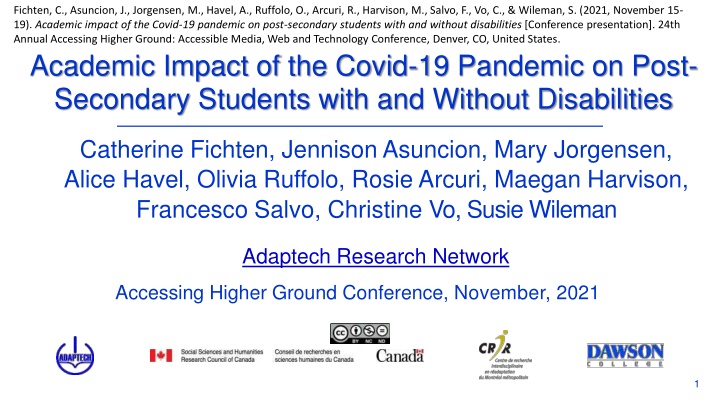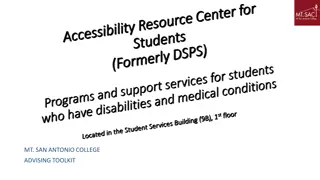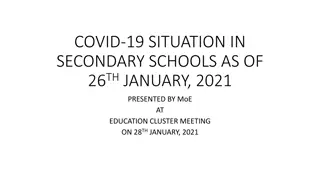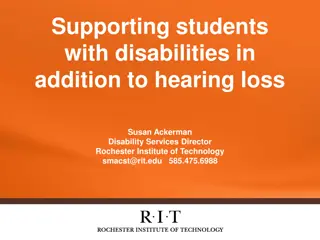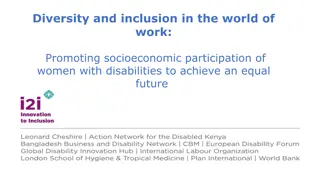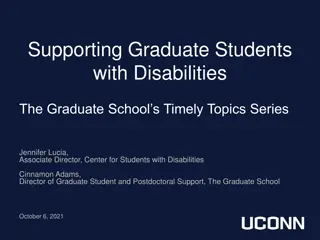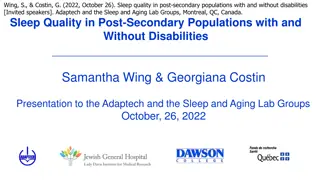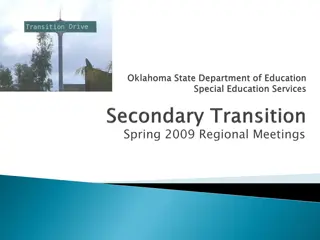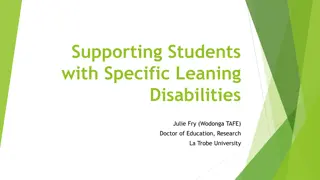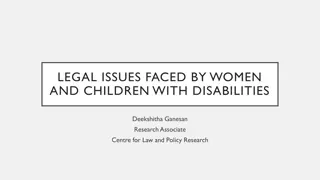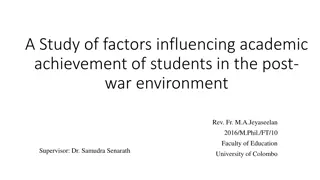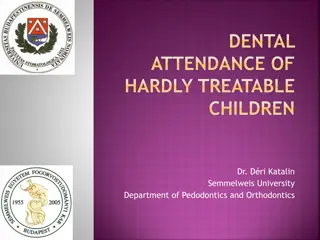Academic Impact of Covid-19 on Post-Secondary Students with Disabilities
This study explores the academic impact of the Covid-19 pandemic on post-secondary students with and without disabilities. It examines the challenges faced during remote learning and the transition back to face-to-face learning in fall 2021. The research involves surveys and testimonials from students, faculty, and campus professionals to understand the disruption caused by the pandemic on academic lives.
Download Presentation

Please find below an Image/Link to download the presentation.
The content on the website is provided AS IS for your information and personal use only. It may not be sold, licensed, or shared on other websites without obtaining consent from the author.If you encounter any issues during the download, it is possible that the publisher has removed the file from their server.
You are allowed to download the files provided on this website for personal or commercial use, subject to the condition that they are used lawfully. All files are the property of their respective owners.
The content on the website is provided AS IS for your information and personal use only. It may not be sold, licensed, or shared on other websites without obtaining consent from the author.
E N D
Presentation Transcript
Fichten, C., Asuncion, J., Jorgensen, M., Havel, A., Ruffolo, O., Arcuri, R., Harvison, M., Salvo, F., Vo, C., & Wileman, S. (2021, November 15- 19). Academic impact of the Covid-19 pandemic on post-secondary students with and without disabilities [Conference presentation]. 24th Annual Accessing Higher Ground: Accessible Media, Web and Technology Conference, Denver, CO, United States. Academic Impact of the Covid-19 Pandemic on Post- Secondary Students with and Without Disabilities Catherine Fichten, Jennison Asuncion, Mary Jorgensen, Alice Havel, Olivia Ruffolo, Rosie Arcuri, Maegan Harvison, Francesco Salvo, Christine Vo, Susie Wileman Adaptech Research Network Accessing Higher Ground Conference, November, 2021 1
Goals Find out about the impact of Covid-19 on academic lives Post-secondary students with & without disabilities During remote learning Back to face-to-face learning in fall 2021 Post-secondary campus access service professionals Post-secondary faculty Based on Survey on 172 students during remote learning period Testimonials by students, faculty and campus professionals 3
Methodology of Survey on Students Participants 55 attended university, 112 a junior/community college 121 students with disabilities 75 females, 39 males, 7 non-binary gender 51 students without disabilities 32 females, 18 males, 1 did not indicate 4
Self-Reported Disabilities / Impairments Students' disability/impairment Number of students The 121 students indicated 218 different disabilities 50% of students had multiple disabilities / impairments Mental health difficulties / psychological disorder Attention deficit hyperactivity disorder (ADHD) Learning disability (LD) Chronic medical / health problem Neurological disorder Visual impairment Hard of hearing / hearing impairment Speech / communication impairment Limited mobility: use of a cane / crutch / walker Limited use of hands / arms Limited mobility: wheelchair / scooter user Autism spectrum disorder Totally blind Deaf 79 39 32 22 11 7 7 6 5 4 3 2 1 0 5
Survey Questions Accessible LimeSurvey administered in fall 2020 Questions What is the impact of the pandemic on your grades? What is the impact of the pandemic on your academic life? 6
Survey Results: Impact on Academic Performance What is the impact of the pandemic on academic performance? Grades: no change Grades: improved Grades: deteriorated Dropped courses Group Students with disabilities Students without disabilities 36% 26% 38% 8% 54% 23% 23% 0% 7
Results Impact on Academic Life Aspect of academic life Negative impact % Positive impact % 4% 4% 1% 2% 2% 4% 2% 4% 2% 2% 2% 0% 2% 0% 0% 0% 1% 0% 6% 6% 8% 4% 3% 2% 1% 2% 13% 14% 1% 0% 16% 18% 17% 8% 15% 16% 13% 14% 14% 4% 12% 2% 11% 4% 8% 2% 6% 2% 6% 2% 6% 8% 5% 0% 2% 4% 3% 2% 17% 10% Concentration Motivation Discipline Legend: Black bars refer to students with disabilities. Light gray bars refer to students without disabilities Difficulty course work Student adjustment to online learning Physical / mental health Availability of help & resources other than tech Communication with professor / supervisor Class engagement with peers / teachers Stress Professors transitioning to online courses Technology Energy / fatigue Availability, flexibility, time management Other 8
Giving People a Voice! Research does not tell the whole story What is the lived pandemic experience Students Campus access service providers Faculty Quotes will start to describe their experiences Session participants will share their experiences 9
Survey Participant Testimonials (1) Research participants remote learning I found it harder to concentrate because I couldn't go elsewhere to study due to the restrictions. It was easier for me to procrastinate when watching or going to a virtual class than a class in-person. 10
Survey Participant Testimonials (2) Research participants remote learning It was harder to get answers to questions from teachers. I was very overwhelmed. 11
Survey Participant Testimonials (3) Research participants remote learning I had more time to focus on my studies and work because I had less commute time (saving 3 hours). I had more time to work on my own schedule. 12
Adaptech Research Network Student Testimonials During Remote Learning (1) Cat, a university student remote learning Recorded synchronous classes have helped the transition to remote learning because they have given me the flexibility to watch at my own pace while also following a regular semester pace of presented material. Increased screen time has lead to increased fatigue, which has impacted my sleep schedule. 13
Adaptech Research Network Student Testimonials During Remote Learning (2) Maegan, a university student remote learning It s been hard to learn from home. Quite anxiety-inducing for me. Having my bedroom be the same place I learn as well as getting countless notifications about my courses every day has made it hard to tease apart my personal time and class time. I find myself worrying about school when I should be having time for myself. It was a very quick transition from using technologies I was comfortable with to suddenly having to use multiple different software or applications for different courses. 14
Adaptech Research Network Student Testimonials During Remote Learning (3) Christine, a college student remote learning Laboratories for science- related courses are much more difficult since I do not have all of the materials required, or no time to go get them due to medical reasons. COVID-19 has stressed me out a lot by making it extremely difficult for me to properly follow along with online courses. 15
Adaptech Research Network Student Testimonials During Remote Learning (4) Rosie, a mature university student remote learning After working for nearly a decade, online courses were the perfect way to get back to school from the comfort of home! The idea of taking classes again after so long was less stressful and I was able to focus on the content rather than spending time and energy getting to being on campus. As a legally blind student, taking classes online meant I was able to use my technology to better: follow class content, access class materials and interact with classmates. School online is an absolute game changer and I m now hoping to complete a Masters online. 16
Adaptech Research Network Student Testimonials During Remote Learning (5) Olivia, social work student remote learning Having to do both school and work remotely made for a very lonely year; zoom was very impersonal and made it difficult to create new or substantial relationships. Teaching assistants were able to provide extra help and constructive feedback on assignments and ensured that all questions were answered. 17
Adaptech Research Network Student Testimonials During Remote Learning (6) Francesco, a college student remote learning A big problem I have with remote learning is being able to stay concentrated. After sitting in the same seat and looking at the same screen for many hours a day my mind starts to drift off. There are also household distractions. COVID-19 and remote learning resulted in me spending a lot more time on screens. As a result, I ended my days with eye discomfort and with my eyes full of tears. 18
Adaptech Research Network Student Testimonials During in Person Learning (1) Cat, a university student - in person learning I wish my school had returned to fully in person instead of this in between state of some classes being online and some in person. It is exhausting to rush between school and home to alternate between in-person and online classes. I feel out of practice for studying for non-open book exams now that some of my classes are back to being in person or have proctored online exams. 19
Adaptech Research Network Student Testimonials During in Person Learning (2) Olivia, a university student - in person learning Being back in school feels good. It gives me somewhere to go every day and allows me to feel like an actual student again. I would love to still be able to choose whether I go in or not. Hybrid would ve been best. 20
Adaptech Research Network Student Testimonials During in Person Learning (3) Francesco, a college student - in person learning In person classes have made me more stressed. This is the result of having to take two hours out of each of my days traveling and having less time to do schoolwork. In person classes have really improved my mental health. I find myself enjoying going to school, opposed to how unhappy I was, attending school online. 21
Testimonials: Campus Access Service Provider Alice, a disability service provider then and now Now. Computers for tests/exams were not viewed as accommodations when classes were online. Now, students who need to use tech must once again request it as an accommodation. This presents a good argument for UDL. Then. As students were usually at home, sometimes I could hear parents coaching in the background. I got in the habit of initially asking who was attending the meeting. 22
Testimonials: Faculty in 2020 (1) Stephanie, a university professor then and now Then: If it weren t for the pandemic and the necessity to have to teach online, I don t think I would have learned all these new skills on my own! Now: We were very fortunate to have outstanding training and support from the University as well. This made it all possible for me. 23
Testimonials: Faculty in 2020 (2) Rajesh, a college professor then and now Then: I did not enjoy the experience of remote teaching as conversation with students was not always spontaneous and thus interaction was limited. On- line work was necessary. Moodle and Zoom are highly accessible to screen readers. Now: I am very glad to be back teaching in person and am pleased to answer many more questions students ask when face-to-face. 24
Testimonials: Faculty in 2020 (3) Robert, a university professor then and now Now that we are back in class, we still have this "bow in our quiver", and we want to use it. Our students want us to use it. In my case, several live lectures are now recorded, so students can "speed it up" "slow it down" or "review over and over. Then: The pandemic forced profs to use unfamiliar but powerful platforms. It became very clear very quickly that these platforms allowed for greater flexibility in terms of delivery. 25
Testimonials: Faculty in 2020 (4) Davina, a college professor then and now Then: I had to completely overhaul my course and learn new technology when school tech support was lacking. Juggling with childcare and elderly parents was stressful. A true mixture of burnout and excitement, depending on the day. A roller coaster year! Now: At first scared to be in small classrooms with 40 breathing students. Got over fear quickly. Teaching with masks challenging. Projecting my voice. Glasses fogging. Which students are speaking? But very happy to see students again. 26
Testimonials: Faculty in 2020 (5) Kelly, a college professor then and now Then: We learned numerous new technologies and platforms, but it was lonely - for both students and teachers Now: Teaching face-to-face again was like "coming home." Students (and teachers) were freshly energized. At this point in the semester, it feels as though the students are disillusioned with the reality of being back on campus and they are struggling more so than usual with motivation and productivity (they got used to the "online/covid way"). 27
Conclusions and Discussion 1.What have your experiences been during remote and newly in person learning? 2.How can understanding the impact of COVID-19 on students inform necessary institutional change? 3.How can research about the impact of COVID-19 inform sustainable practice? 4.How can understanding the impact of COVID-19 on students inform future faculty training? 28
Thank You! Adaptech Research Network: www.adaptech.org Catherine Fichten: catherine.fichten@mcgill.ca 29
